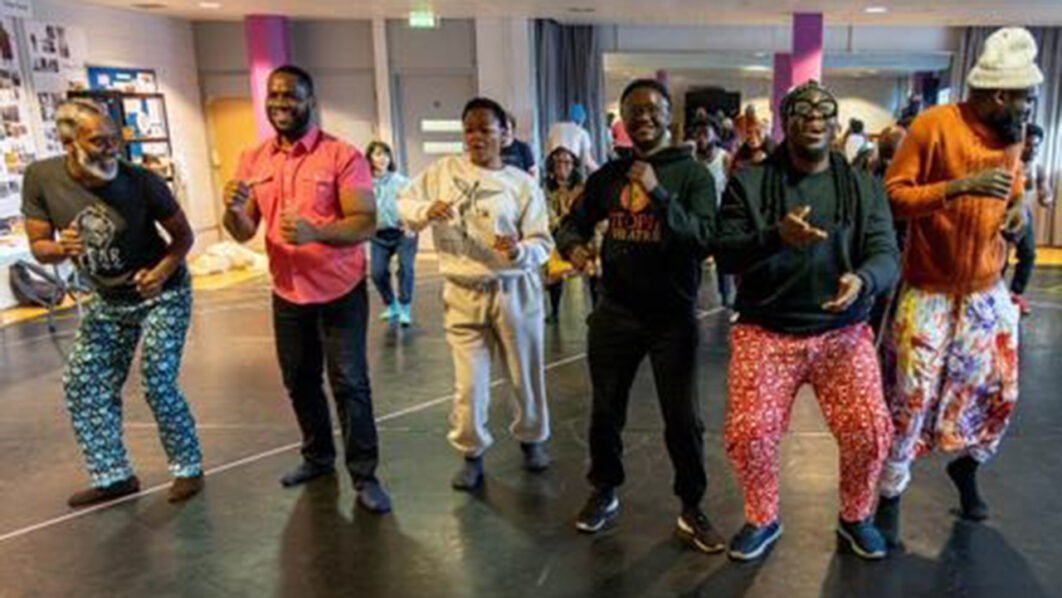
In Death and the King’s Horseman, Wole Soyinka celebrates the Yorùbá people’s belief about human existence, the continuity of life after death, and the dynamics of creation. Yorùbá art, religion and philosophical tradition have offered cultural inspiration since its ancient roots dating back to 1500 BCE and continues to intrigue scholars and artists worldwide. The Yorùbá world is an integrated whole containing the world of the living, the world of the dead, and the world of the unborn all of which are linked together by the fourth realm, which Soyinka describes as the numinous passage or abyss of transition.
Birth and death are two important ontological journeys that represent the metaphysical process by which relationship of the living and the dead are sustained. Music, chant, dance and other related aesthetic resources used in the play are also some of the ways in which the rites are observed.
Storytelling among the Yorùbá people is a revered art, a major activity for fostering social bonds, unity, and cooperation, thereby contributing to society’s cohesion. Drums and music also add to the aesthetics of telling stories, contributing to the comprehending of the Yorùbá worldview in time and space. Soyinka delves into the hallowed tradition of his people, demonstrating how dialogue, rhythm, and action in the theatre are presented with meaning, coming out not only from the songs and dances, but also from proverbs, wise sayings, and praise poems.
Since its publication in 1975, the play has had a truly remarkable staging history that is quite difficult to fully capture here, three by Soyinka himself: the premiere at the Oduduwa Hall, University of Ife (later Obafemi Awolowo University, Ile-Ife, Nigeria, 1976), the Goodman Theater, Chicago (transferred to the J.F. Kennedy Center for the Performing Arts, Washington DC,1979), and the Vivian Beaumont Theatre (London Centre, New York, 1987).
Stagings in Nigeria include: the University of Ibadan Arts Theatre (directed by Segun Ojewuyi, 1984), the National Arts Theatre Lagos (directed by Bode Osanyin, 1988), the Lagos Diamond Production/Nigerian International Bank (directed by Bayo Oduneye, 1990), and the MUSON Centre, Lagos celebrating Soyinka’s 70th birthday (directed by Ahmed Yerima) among others.
While its international productions included the XII Festival Internazionale del Teatro Universitario, L’Aquil (directed by Giancarlo Gentilucci, 1986), Manchester Royal Exchange theatre Company (directed by Phyllida Lloyd, 1990), Taylor Theatre, University of North Carolina, Greensboro (directed by Alan Cook, 2006), the Fehinty African Theatre Ensemble (FATE) at the Bailiwick Arts Center, Chicago (directed Adekunle Akingboju, 2007), the St. Louis Black Repertory Theatre and the SIUC Theater Department (directed by Segun Ojewuyi, 2008), the Royal National Theatre, London (directed by Rufus Norris), and many other high-profile productions in universities and major art centres across the globe.
Staging of the play in Sheffield Theatre in 2025, the 50th year of its publication and a few months after Soyinka clocked 90 years, may well be a worthy birthday present to the playwright and the first writer of African descent to be awarded the Nobel Prize for Literature in 1986.
Reviews have emphasised how Soyinka depicts a world rich in ritual, where modern technology fits uneasily among ancient spirits, and forges a unique dramatic language in which the natural and supernatural combine in traditional ritual performance.
While the play brings together myriads of narratives, fables, songs, chants and dances celebrating and elegising the terror of death, and showing that death is a universal concept, Soyinka insisted that what he dramatises is “largely metaphysical, contained in the human vehicle which Elesin and the universe of the Yorùbá mind.”
Directed by Mojisola Kareem, founder and artistic director of Utopia, a National Portfolio organisation established in 2012, this production is indeed historical and significant, highlighting the company’s aim of creating exceptional world-class African theatre with imaginative flair for the British and international stage.
An excerpt from Balogun’s notes on Wole Soyinka’s Death and the King’s Horseman, which runs from February 3 to 8, 2025, at Sheffield Theatres, UK, courtesy of Utopia Theatre. Directed by Mojisola Kareem, the performance features Lagos-based actors, Wale Ojo and Kehinde Bankole in the lead. Balogun, consultant on culture at Utopia Theatre and dramaturg of the play, is a lecturer in New Writing and Intercultural Performance, School of Performance and Cultural Industries, University of Leeds, UK.






